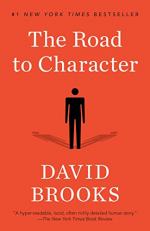
|
| Name: _________________________ | Period: ___________________ |
This test consists of 15 multiple choice questions and 5 short answer questions.
Multiple Choice Questions
1. What, according to Brooks, is one key paradox of pride?
(a) It often shows up in people who are in the upper classes.
(b) It often combines extreme self-confidence with extreme anxiety.
(c) It often combines jealousy and rage.
(d) It often results in disaster.
2. Where did Randolph move at the beginning of his career?
(a) Chicago.
(b) Selma.
(c) Harlem.
(d) Orlando.
3. How did his wife's death change Marshall's approach to life?
(a) He became less taciturn and more social.
(b) He went to medical school.
(c) He left the military and took a new job managing a charity.
(d) He withdrew from public life and languished in solidarity.
4. Between which two ideals was Augustine caught even as a young boy, according to Brooks?
(a) Those of the Roman Empire and those of the Greek Empire.
(b) Those of the classical world and those of the Judeo-Christian world.
(c) Those of the West and those of the East.
(d) Those of his family's and those of the church's.
5. What W.H. Auden poem does Brooks reference to help describe Eliot's decision to be with her life-long romantic partner?
(a) Life on the Edge.
(b) Taking the Plunge.
(c) Leap Before You Look.
(d) Oh How a Rose.
6. Who did Eliot often dedicate her novels to?
(a) Henry James.
(b) Sinclair Lewis.
(c) Upton Sinclair.
(d) George Lewes.
7. What disgusted Marshall about President Roosevelt's reaction to his news that plans for the North African invasion during WWII was ready?
(a) President Roosevelt asked that the invasion happen before Election Day.
(b) President Roosevelt told Marshall to slow the plans down.
(c) President Roosevelt did not ask for a casualty count.
(d) President Roosevelt asked to be there so he could release photos to the press.
8. What was Marshall's first assignment after the death of his wife?
(a) Chief of Staff of the military.
(b) Supreme Commander of the Allied Forces in Europe.
(c) Leader of the Infantry School program at Fort Benning.
(d) Professor at the War College.
9. Whose house did Eliot live in for a time along with this person's wife?
(a) James Ford.
(b) Henry James.
(c) Dr. Robert Brabant.
(d) Charles Dickens.
10. Who did Eliot fall in love with when she was 32?
(a) James Byron.
(b) Henry Wordsworth Longfellow.
(c) Herbert Spencer.
(d) Ralph Elison.
11. Where did Bayard Rustin grow up?
(a) New York.
(b) Los Angeles.
(c) West Chester, Philadelphia.
(d) Chicago.
12. What kind of a romantic relationship did Augustine have for more than a decade?
(a) A strong marriage to one woman, Cassandra.
(b) An arranged marriage to a distant cousin.
(c) A relationship with a common-law wife.
(d) A close relationship with a concubine.
13. What event did Randolph plan to organize in 1941 to highlight the discrimination against blacks in the workforce?
(a) A sit-in at churches across the country.
(b) A sit-in at lunch counters.
(c) A bus boycott in Alabama.
(d) A giant march on washington.
14. What did Winston Churchill do when he visited Marshall in the hospital during his final illness?
(a) Spoke to the doctors about new avenues for medical care.
(b) Weeped at the doorway.
(c) Brought flowers and chocolates.
(d) Consoled Marshall's son.
15. Where was George Marshall born?
(a) Columbus, Ohio.
(b) Newton, New York.
(c) Uniontown, Pennsylvania.
(d) Scranton, Pennsylvania.
Short Answer Questions
1. In what situation was Marshall injured during his college years?
2. What kind of illness did Marshall's wife suffer from?
3. What pacifist organization did Rustin join after moving to Harlem?
4. Who offered to marry Rustin?
5. What was Augustine's first step to reforming his own life?
|
This section contains 602 words (approx. 3 pages at 300 words per page) |

|




